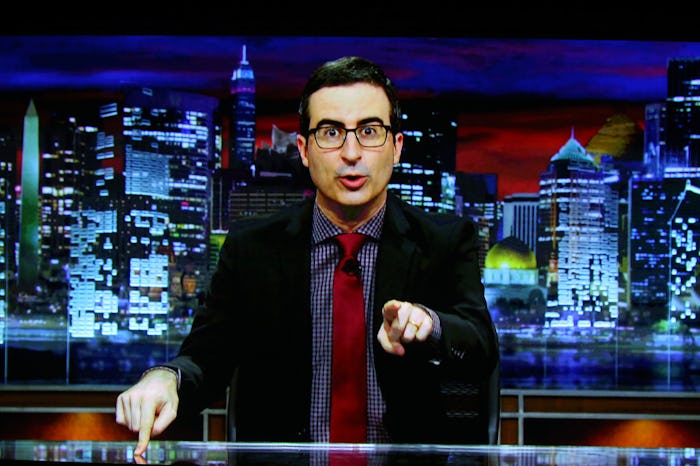Entertainment

Why Americans Need To Start Listening To John Oliver
It's been two years since John Oliver burst into the political satire scene tasked with explaining a skeptical audience the news of the week. Fresh from a stint as the interim host of the Daily Show when he launched Last Week Tonight, few bet on the British comedian's success as a host on late night American television. It's a tough road for foreign political pundits in the United States. (Just ask Piers Morgan and Oliver's late night counterpart, Daily Show host Trevor Noah.) Yet a few months into his new gig, Oliver had seemingly taken the Internet by storm. And given his dry humor and rigorous takes on recent topics like the controversial "Brexit" and the Donald Trump's border wall, here's why Americans need to start listening to John Oliver — and perhaps more importantly, taking him seriously.
Last Week quickly established a different tone than audiences had seen on The Daily Show and The Colbert Report when it first debuted. Yes, there was a healthy dose of humor, but unlike other late night shows, the jokes were not the focus, rather a tool to help the audience digest the news. Oliver did not want folks to laugh and move on. His goal was to jolt the audience into action. That action was often directly referenced and broken down into steps, whether it be flooding the FCC with emails on net neutrality-the bit that made him famous-or donating to alternate funds for women, instead of supporting Miss America.
"The list of topics sounds like the arcane scraps from the cutting-room floor of most newsrooms — the amount of hidden sugar in food, civil forfeiture, the false hopes of lotteries, the failure of the American government to safeguard people who served as interpreters in Iraq and Afghanistan," wrote Media Critic David Carr of The New York Times, who admitted he wrote Oliver off at first.
Overnight, John Oliver gave the United States what it desperately needed: solid, independent, investigative journalism.
We need to start listening to John Oliver because we have no other choice. With newspapers folding at a startling rate, and websites trading hard hitting stories for viral listicles, Last Week filled a gaping hole in American journalism. Investigative reporting is on life support, the International Consortium of Investigative Journalists declared, months before Oliver's show premiered.
A European immigrant with an American wife, Oliver brings a fresh pair of eyes onto complicated, oft-forgotten topics, like veteran's rights and the IRS. Oliver's comprehensive look at Net Neutrality even won him the praise of the man who coined the very term, Tim Wu.
The comedian had one more advantage on traditional media: he was bound to no one. Oliver found a home at HBO, where his curse-ridden diatribes could stretch uncensored and uninterrupted. On top of that, the commercial-free format gave him a free range of targets.
As an outsider, Oliver also gets to take more risks and get away with harsher segments because he does not carry the baggage of the political left. To be sure, he doesn't toe party lines. Oliver has an agenda. In many ways, Last Week is a call to arms for a generation more prone to posting Facebook updates than hitting the polls.
In fact, just one month after the show did a segment on how bail requirements for non-violent offenses can keep people locked up before they are charged with a crime, New York City announced it would reform bail laws. His unique perspective allows Americans to question why our politics work the way they do. In doing so, he fights against the malaise, false balance and partisanship that has suffocated political discourse.
But the true power of Last Week Tonight has been felt during the presidential election. When speaking about American politics, Oliver wisely switches from "you" to "we." The simple pronoun change gives the segment an urgent, non-pompous air that evades so many other commentators. He has a stake in this too.
Oliver's two-sided perspective came together perfectly in last week's episode, where he effortlessly explained the consequences of the Brexit vote and in the same breath warned Americans that the November presidential election could meet a similar fate, if it not taken seriously.
"You might think, 'Well, that is not going to happen to us in America. We're not going to listen to some ridiculously haired buffoon peddling lies and nativism in the hopes of riding a protest vote into power,'" Oliver said. "Well, let Britain tell you it can happen. And when it does, there are no f---ing do-overs."
It's time America listened to Oliver and accepted him for for what he is: not just a whip-smart comedian, but one of the country's most influential journalists.